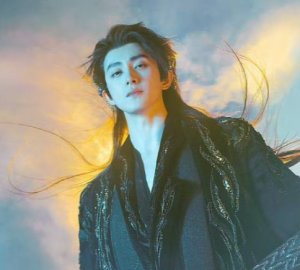
Memories Anchored in The Pavilion
The Premise -
In the ruins of a world cracking beneath the weight of its own pride and blood-soaked history, Love in Pavilion blooms as a love story, disguised in soft glances and restrained gestures, at first glance. However, beneath the sweeping robes and ancient vows lies a deeper, bitter undercurrent—where politics is war dressed in silk, and love is a rebellion far too dangerous to name aloud. It is in this volatile setting, two leaders, born of legacy and burden, are propelled towards each other only to be dragged back by the chains of duty and consequence.
The MCs-
Wangquan Hongye, brought to life with a devastating quietude by Zhang Yunlong, is not a man who reveals himself easily. His presence is blade-sharp, deliberate, and veiled in stoicism. Every word he speaks is filtered through decades of expectation, every action weighed against the legacy of the Wangquan clan. But it is in his silence where he speaks the loudest—where the tremor of an unsaid truth or a glance held too long betrays the man beneath the mask. He is not heartless. He is simply a man who has long since buried his heart for the sake of survival.
Dongfang Huaizhu, by contrast, is fire kept in porcelain. Liu Shishi captures her grace and pain with haunting precision. Huaizhu does not yield—she leads with a warrior’s poise and a healer’s compassion, forever torn between the preservation of peace and the ghosts of those she could not save. She wears her loss like armor, but even steel cracks under the pressure of too many expectations. Her alliance with Wangquan Hongye is not built on flirtation or fantasy, but on mutual wounds, shared silences, and an understanding forged in fire.
The Chemistry -
Zhang Yunlong delivers a mastepiece as Wangquan Hongye, embodying the character's stoicism, inner conflict, and restrained vulnerability with remarkable precision. His portrayal balances the weight of leadership with the quiet ache of unspoken longing, creating a complex and deeply human figure. Yunlong’s nuanced expressions and controlled emotional delivery breathe authenticity into every scene, making Wangquan Hongye both enigmatic and profoundly relatable. His on-screen chemistry with Liu Shishi, who plays Dongfang Huaizhu, is nothing short of mesmerizing—their subtle glances, unspoken tensions, clasped hands and shared silences speak volumes, crafting a slow-burning connection that feels both tragic and timeless.
Liu Shishi brings Dongfang Huaizhu to life with a mesmerizing and deeply nuanced performance, embodying the character with a haunting elegance and emotional restraint that is both powerful and deeply moving. She brings a quiet intensity to every scene, portraying Huaizhu’s inner turmoil, unwavering resolve, and buried vulnerability.
Her chemistry with Zhang Yunlong, who plays Wangquan Hongye, is simply sublime—an intricate dance of unspoken emotions and silent glances that pulse with tension and longing. Together, they command the screen with a connection that feels timeless, elevating their tragic romance into something achingly profound and unforgettable.
The Conflict-
Together, they are not lovers in the traditional sense. Their connection is slow-burning, buried beneath politics, wars, and the shattered remains of the Yiqi Alliance – a faction that’s barely managing to keep the vultures of war and death from unleashing itself upon this world.
However, it is precisely in that restraint—the aching pause before a confession, the brush of fingertips across a bloodied sleeve, the willingness to sacrifice not just their lives but their desires—that the bond between Wangquan Hongye and Dongfang Huaizhu becomes undeniable, concrete, timeless. Their chemistry is not loud, but it reverberates. It’s the kind of love that adds a layer of realism, reflecting the complexities of love amidst duty.
The series itself threads its narrative with that same aching restraint. It’s not interested in easy resolutions or romantic fantasy. It deals in hard choices, blurred lines, and impossible loyalties. Every moment of connection comes at a cost, every brief reprieve shadowed by betrayal or loss. And through it all, the Pavilion remains—a symbol of what once was, what might have been, and what will never be again.
Cinematography & Direction -
Visually, Love in Pavilion stuns. Its beauty is deliberate, almost cruel in how it juxtaposes the elegance of tradition with the brutality of war. The Bamboo Pavilion, where the two leads share many of their pivotal scenes, feels like a haunted relic—something out of time, echoing with all the things left unsaid.
The series is a visual treat, with meticulous attention to period details, costumes, and settings. The Bamboo Pavilion by the Huai River, a recurring motif, symbolizes the transient nature of life and love. The incorporation of traditional Chinese elements, from martial arts choreography to cultural rituals, enriches the viewing experience, grounding the fantasy elements in a tangible reality.
Conclusion-
In the end, Love in Pavilion doesn’t offer salvation. It offers understanding. A recognition that love, in some lives, must be endured rather than embraced. That power often demands the ultimate sacrifice—not of life, but of self. Wangquan Hongye and Dongfang Huaizhu do not defy fate. They become it. And in doing so, they leave behind a legacy not of what was conquered, but of what was lost in the act of trying to hold on.
Was this review helpful to you?





















